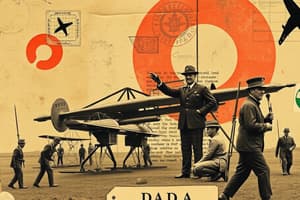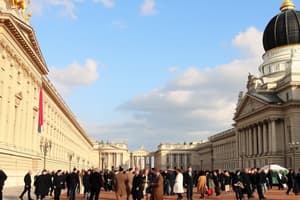Podcast
Questions and Answers
What was the purpose of the War Industries Board (WIB)?
What was the purpose of the War Industries Board (WIB)?
- To promote propaganda.
- To handle espionage activities.
- To lead the food administration.
- To coordinate the purchase of war supplies. (correct)
Who advised President Woodrow Wilson on national defense?
Who advised President Woodrow Wilson on national defense?
Bernard M. Baruch
The Food Administration aimed to convince people to eat more food during the war.
The Food Administration aimed to convince people to eat more food during the war.
False (B)
Who led the Food Administration?
Who led the Food Administration?
The _____ was used to help the Food Administration grow food.
The _____ was used to help the Food Administration grow food.
What is propaganda?
What is propaganda?
The Committee on Public Information aimed to discourage people from joining the war effort.
The Committee on Public Information aimed to discourage people from joining the war effort.
Who was George Creel?
Who was George Creel?
The Espionage and Sedition Act allowed criticism of the war.
The Espionage and Sedition Act allowed criticism of the war.
What was the Great Migration?
What was the Great Migration?
What was the 1918 Influenza?
What was the 1918 Influenza?
What was the outcome of Schenck v. United States?
What was the outcome of Schenck v. United States?
Flashcards are hidden until you start studying
Study Notes
War Industries Board (WIB)
- Established on July 28, 1917, during World War I to coordinate the purchase of war supplies for the United States.
Bernard M. Baruch
- Advised President Woodrow Wilson on national defense and peace terms.
- Served on the Advisory Commission to the Council of National Defense.
- Became chairman of the War Industries Board in 1918.
Food Administration
- Aimed to encourage citizens to conserve food to support troops.
- Promoted initiatives to reduce personal consumption for the benefit of soldiers overseas.
Herbert Hoover
- Led the Food Administration, focusing on food conservation strategies during the war.
Victory Garden
- Private gardens utilized to increase food production and support the Food Administration's efforts.
Propaganda
- Aimed to influence public attitude toward war efforts by presenting a one-sided narrative.
Committee on Public Information
- Established to promote war support and persuade citizens to enlist in the military.
George Creel
- Investigative journalist and politician, served as head of the Committee on Public Information, promoting pro-war messaging.
Espionage and Sedition Act
- Legislation that prohibited interference with military operations and criminalized anti-war speech or actions.
Great Migration
- Movement of many African-Americans from the Southern states to the Northeast and Northwest, driven by the pursuit of freedom and better opportunities.
1918 Influenza
- A devastating epidemic that caused widespread illness and fatalities, with no methods known for control or prevention at the time.
Schenck v. United States
- A landmark Supreme Court case where journalist Charles Schenck was convicted for opposing the war; the court ruled in favor of limiting speech that posed a clear and present danger during wartime.
Studying That Suits You
Use AI to generate personalized quizzes and flashcards to suit your learning preferences.




